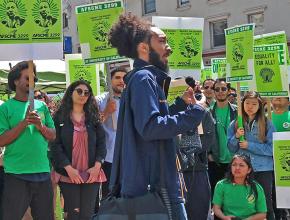Poverty wages at UC disgrace King’s legacy
and report on a statewide day of action by University of California workers that invoked Martin Luther King's legacy to demand a living wage.
ON APRIL 4, workers in the University of California (UC) system honored the 50th anniversary of Martin Luther King's assassination by taking part in a day of action to call for UC's most vulnerable workers to be given the pay and dignity the deserve.
In Los Angeles, hundreds of students and members of AFSCME Local 3299, which represents many UC workers, blocked traffic at the intersection of Wilshire and Westwood Boulevards, and 18 protesters were arrested. A similar sized protest and sit-in took place in Berkeley, although there were no arrests.
After the protest, Local 3299 announced that a vote to authorize a strike would be held on the week of April 15.
In Berkeley, approximately 200 workers, family members and supporters rallied on the edge of the UC Berkeley campus at the intersection of Telegraph and Bancroft to demand a fair contract for the service and janitorial workers who have been at the bargaining table for months with UC.
Students and workers from campuses around the Bay Area were present, along with city and county officials, including Berkeley Mayor Jesse Arreguin and Alameda Labor Council Executive-Treasurer Josie Camacho.

"I'm here because we need a new contract, and we need to show UC that we're serious," said UC San Francisco vocational nurse Charlene Keraly. "They want to offer 2 percent across the board, but they also want to raise our health premiums, which cancels out the 2 percent. We're asking for 6 percent...We want UC to know that we are ready to strike if we have to."
The large mass of green AFSCME 3299 shirts was dotted with picket signs featuring Dr. King's face, in honor not only of King himself, but the Memphis sanitation workers strike for which he was organizing support when he was murdered. "[King] represented so much to the average working-class person," said Keraly. "He didn't do it for recognition, he did it from the heart. It's an honor to be here for him."
"We're out here to honor the man who made it possible for the majority of students on campus to actually be on this campus," said Black Student Union and Muslim Student Association leader Abdullah Puckett.
"People say they support the causes that King supported, but they don't really support the causes that he supported. We have to stand with the workers' movement if we want to support his legacy."
AS THE cost of living in California has increased, the already glaring inequality among workers at the University of California has grown worse. The university continues to try to contract out their low-wage workforce in order to avoid paying benefits and adjusting pay for seniority or the cost of living.
This wage theft disproportionally affects immigrants, women and people of color, who depend on these positions for their livelihood. AFSCME's recent study "Pioneering Inequality: Race, Gender, and Income Disparities at the University of California" details the disparity in pay and job opportunities for Black workers, immigrant workers and female workers at the University of California, the largest employer in the state.
AFSCME calls on the UC to "do more to combat inequality within its ranks" and "take steps to address the wide ranging inequities and abuses faced by vulnerable outsourced workers--including hiring them directly or guaranteeing them equal pay with career employees who do the same jobs."
The Berkeley demonstration started with a speak-out at noon on the sidewalk at Bancroft and Telegraph. Speakers spoke about the union fight for a fair contract, about research the union has done exposing racist and sexist unequal pay policies at the UC, about the anniversary of King's assassination when he was standing with AFSCME sanitation workers in Memphis, and how this fight stands in that same tradition of anti-racism, anti-militarism and standing against exploitation.
Then, the group of about 200 marched around the block. Chants included, "Equal pay, equal work!" and "What do we want? Justice! And if we don't get it? Shut it down!"
When the rally returned to Bancroft and Telegraph, about 30 people, including Mayor Arreguin, sat down in the middle of the intersection, while everyone else formed a picket line by walking in a larger circle around them. The picket blocked the intersection, shutting down traffic for about an hour.
There were no arrests, in stark contrast to the brutal tactics of the UC police against a Local 3299 action in the same location in February, when dining hall worker David Cole was slammed into the pavement and denied hospital treatment for several hours while he was being booked.
The April 4 rally was also about double the size of that earlier demonstration, indicating an increase in support from the student community for workers resisting the university's attempt to force through a contract that would in real dollars amount to a wage freeze.


